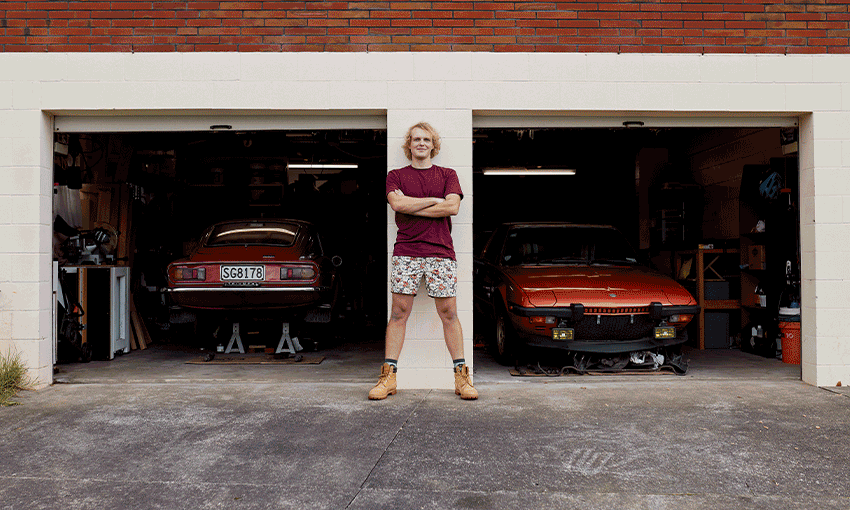Research from AA Insurance reveals more and more people are taking pride in their garage. Meet three New Zealanders using their space in creative ways.
If you think of a garage, you might picture a dark room with a parked car. There might be some tools on the wall, or boxes of miscellaneous homewares that were never unpacked. You’re probably not picturing a space you want to spend a lot of time in.
Or maybe you are? Because new national research* commissioned by AA Insurance has revealed that more and more people are taking pride in their garage, using the traditionally dingy space for a myriad of far more interesting – and creative – activities.
Shaun Rees, AA Insurance chief product and marketing officer, says that as a metaphorical representation of the everyday New Zealand home, the garage often reflects different life stages, uniqueness and passions. “We know that there is a lot of living done in the garage, and it’s a truly versatile space that can be anything you want it to be. We wanted to get in behind the garage door, and find out how Kiwis were really using them.” This study was the first of its kind in New Zealand to look into how garages are actually being used.
It led to some interesting – and surprising – findings. “We knew there would be a lot of functional use, but were surprised to find that almost half – 46% – of people surveyed said they had an emotional connection with their garage as well. They saw it as a place to relax and unwind, but also a place of creativity,” Rees explains.
The research also revealed 30% use their garages as a workshop, while 20% use it as a space to socialise or entertain. “It was good to see that traditional Kiwi garage parties are still popular,” laughs Rees. “Through our research we also found that Kiwis who are lucky enough to have a garage, really take pride in using a space well and not wasting it”, states Rees. “For some people, the busier, messier or more disorganised their garage was – the prouder they were.”
But how else could you be making the most of your garage? Three people who use their garage in different and interesting ways opened up their roller doors and let The Spinoff in for a visit.
Isaac Grigor (‘Woodworker’, Auckland)
Isaac Grigor was described to me as a “woodworker”, but that’s not how you’d ever hear him refer to himself. “I think woodworkers would be insulted if I was to describe myself as a woodworker,” he laughs.
Having visited his East Auckland home, I doubt that’s true. But there’s certainly a lot more going on inside the mechanical engineer’s immense four-car garage than just woodwork. It’s a place, says Grigor, to do “anything and everything”, most of it embodying the classic New Zealand mindset of “I reckon I can figure this out”.
“Whenever there is something to be done around the house or for friends, it’s done in here,” he says. “My job is often heavily analytical and I don’t have creative outlets at work. I like to have those creative outlets at home.”
The garage still has all the “traditional shit”, says Grigor, pointing out some stashed camping gear, power tools and a cupboard filled with family Christmas decorations. “You’ve got to have the cupboard where your family’s Christmas decorations that you keep getting given every year can go,” he laughs.
Among the things in the garage right now: a trio of cars (not working), a motorbike (working), homebrewed beer and equipment for making soap, resin art, and wooden chopping boards – often gifted to friends and family. “I make all my own soap, not for any reason other than it’s quite fun,” he says. Most of Grigor’s resin art is done on old chopping boards from op shops which make great gifts. Next on his to-do list: “I’d love to get a potters’ wheel.”
He’s moving out in a couple of months, and everything will have to go. But until the reality of clearing everything out kicks in, Grigor’s proud that his garage has been used to the fullest, rather than just filled with stuff. “The New Zealand garage is almost like a tradition. If there’s anything to do with a number eight mentality in New Zealand it usually has to do with a shed… but garages are the urban version of a shed,” he says.
Craig Herron (Home brewer, Christchurch)
I pictured a plastic white tub that wouldn’t have looked out of place in a student flat, but in reality, Craig Herron’s Christchurch garage is decked out with an incredibly impressive micro-brewery.
Driving into the double garage doors, you’re greeted by a trio of large 70 litre brewers, along with a fermentation area and a fridge. It is, says Herron, just a smaller version of what any commercial brewery would have.
“It’s a relatively new house, we built it six years ago, and I got into brewing at the same stage so I planned an area for the brewery with all the bits and pieces that need to go with that,” he tells me. It’s become something between a meeting place, a home brewery and, occasionally, somewhere “the car gets parked when it needs to be”.
A panel beater by trade, Herron now works a desk job and says he was looking for a creative hands-on outlet. “I’ve always enjoyed beer, as most Kiwi blokes do, and I came across a couple of YouTube channels and started doing a bit of research,” he says. His hobby has since seen him pick up awards, including the best IPA in the country at a nationwide homebrewing competition last year. He also scored a gold for his Hazy IPA – “the one that gets the guys around for a beer” – and a bronze for a pilsner.
The garage still manages to fit his car (somehow), but two walls are fully dedicated to his craft. While he’s considered taking his love of brewing professional, Herron says it’s already a lot of work. “It takes about five hours to brew a beer. If you talk to most brewers, they’d say it’s about 80% cleaning and 20% brewing,” he explains.
It might be a lot of work, but it certainly comes with its benefits (and his mates certainly aren’t complaining).
Whitney Barnes (Seamstress, Auckland)
If Whitney Barnes was stranded on a desert island, you can bet on the one item she’d choose to bring: her sewing machine. “I think if I redid my life, I probably would have just… gone and worked as a machinist somewhere. I love it so much, it’s kind of relaxing, like how some people might come home and read a book, I like to come home and sit in my garage at the sewing machine.”
It was while studying textiles in high school that Barnes discovered her love of sewing, first making herself a dress she used to wear “all the time”. She now works in the fashion industry, but says everything she does in her Auckland garage is a hobby. “I don’t do anything here that makes me money. If I want a new piece of clothing, I would never go and look to buy it, I would look to make it,” Barnes says.
“After I moved out [of home], I brought everything with me. One day I’d love to buy my own house, and a garage is my non-negotiable must-have.” She gestures around at the equipment, patterns and fabrics. “I couldn’t not have ‘this’ – and where else to put it but a garage?”
Right now, she’s making a shirt for a friend and says she makes practically all of her own clothes as well. “I think pants are the easiest, shirts are sort of a step up,” she says. “I try to be sustainable about it, I shouldn’t really just sew things because I can – I always think ‘do I really need that shirt’, ‘should I be buying this fabric?’”
Last year’s floods threatened to damage some of Barnes’ most prized possessions, meaning everything is now raised above the ground and she’s invested in contents insurance (“mostly because of stuff in the garage”). It’s not just the sewing equipment, there’s also an old upright piano that was in Barnes’ family home as a child. “As soon as we moved into this house my mum was like, ‘you’ve got a garage, you’re taking the piano’.” From sewing gear to family heirloom pianolas, the contents of humble Kiwi garages know no bounds.
Along with her sewing machine, it’s her cutting table that Barnes is most attached to. “I got this off Trade Me maybe 10 or 12 years ago for about 60 bucks and I look at it now and I’m like, wow, that’s a really decent table that would cost me more than 60 bucks to rebuild – I don’t wanna lose that.”
Barnes says she feels lucky to have a space like this, one that she can “leave in a mess” if she wants and not have to worry about. “I like that it’s away from the house so I can separate myself and be like ‘bye, I’m going to the garage’,” she says. While there are many benefits to parking your car in the garage, Barnes is quite happy to let hers “chill in the driveway.”
*AA Insurance research conducted by Kantar. A nationally representative sample of over 1000 New Zealanders (aged 18+) completed an online survey in February 2024 (margin of error 3.1%)


